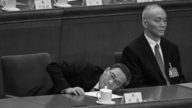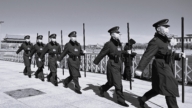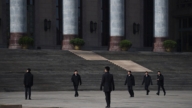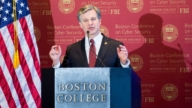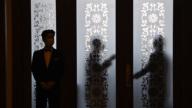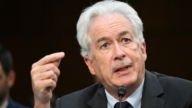【新唐人2013年06月07日讯】6月4号,中共广电总局颁布了22条新规定,集中整治电视剧市场,首先对电视剧播出总量、范围、题材、时机、时段等做出限定,规定还要求对电视剧开播前进行严厉的审查程序,同时限制古装、涉案、引进、合拍等题材的电视剧。评论认为,这些规定主要是配合当局进行新一轮的洗脑,加强禁锢人民的思想,避免电视剧内容引起民众的联想。
这项名为《卫视综合频道电视剧播出调控管理办法》的规定中,要求播出现实题材电视剧的总集数,要达到黄金时段集数的50%;古装题材播出的总集数不能超过15%﹔涉案剧则根据内容进行划分﹔引进剧和合拍剧,必须按发行许可证标注的时段播出。
新规定还要求,电视播出机构对所属卫视播出的电视剧,进行播前审查和重播重审。总局对卫视黄金时段播出的电视剧,实行备案和抽查审看制度。省级播出机构需要将所属黄金时段电视剧排播计划上报,经审核无原则性问题,再按总局意见修改后安排播出。有原则问题的,不仅要换播,还要追究相关审查机构的责任。
北京时政观察人士华颇分析认为,这22条规定,主要是配合当局进行新一轮的洗脑,加强禁锢国民的思想,当局怕一些电视剧播出来后引起民众的联想。
北京时政观察人士华颇:“尤其黑龙江那场大火,使大家和一部古装剧联系在一起,那就是‘天下粮食’,是写乾隆年间,贪官污史为了毁灭证据,就把天下官仓一把火烧掉了。所以黑龙江中储粮大火点燃之后,尤其是中纪委巡视团刚入主中储粮,这边就发生这场特大的火灾,所以舆论、人们思想一下和这部电视剧联系在一起。”
华颇指出,最近再加上东三省连续发生大火,造成严重人员伤亡,财产损失,华颇说,现在中共面临危险的局面。
华颇:“而且又发生了前一阵子左派一系列向自由派的进攻,但是,左派实为进攻自由派,其实是对主流派、政派的进攻,其实是对着邓小平的理论在叫板,可以说在中国的思想文化领域上,出现了严重的混乱,严重的分裂,所以它现在要加强掌控,它不能在卫视的这些电视节目上再出现严重问题。”
原《河北人民广播电台》编辑朱欣欣指出,中共当局这次对电视剧的整顿,跟中共的政治需要以及和当前的形势有关。
原《河北人民广播电台》编辑朱欣欣:“一个是国内的情况,各地连续爆发一些群体事件,社会矛盾越来越尖锐,尤其是官民的冲突,再一个,除了领土的纠纷,还有经济方面的一些冲突,在不断的加剧。这样,在内外交困的情况下,中共要严格的控制文艺,尤其是电视剧。”
朱欣欣指出,因为电视剧可以借古讽今,表达老百姓的声音,和传播一些西方民主自由等思想,令中共害怕,所以它鼓励播出管控下的现实剧,限制古装、合拍剧,甚至禁播引进剧等。
朱欣欣:“它还是想用利于中共的所谓红色经典、或者有利于中共虚假的历史进行美化、进行歌颂的电视剧,来占领黄金时间,想利用这个对老百姓洗脑,说明老百姓的娱乐节目、古装剧这些多了以后,就会削弱中共洗脑电视剧的宣传,所以它要保证中共洗脑电视剧的播出。”
朱欣欣说,在中共独裁专制下,老百姓想看一些娱乐节目的自由都没有,一切和中共宣传无关的,或不利它洗脑宣传的,统统都要扼杀,说明中共越来越脆弱,也越来越恐惧。
而华颇表示,现在的媒体都是市场化运作,媒体想生存下去就要灵活的打一些擦边球,所以他认为,这次中共当局对电视剧的整顿,注定不会成功。
采访编辑/李韵 后制/萧宇
China SARFT issued 22 new regulations to clamp down on the television market
On June 4, the China State Administration of Radio,
Film and Television (SARFT) issued 22 new regulations,
which concentrate on controlling the television market.
The regulations limit the volume, scope, subject matter,
and air time, and requires all TV series to pass through strict censorship.
In addition, dramas, criminal investigation shows, imported
TV series, and co-produced programs have been limited.
Commentators think these regulations have been issued
to support a new round of brainwashing by the Chinese Communist Party (CCP),
and are mainly used to imprison people’s minds
as well as to avoid people from associating TV show content with real-life current events.
The regulation, “Satellite Integrated Channel TV Sets
Broadcasting Regulations and Managing Approach,”
requires that the total quantity of reality shows must reach
50% of the total broadcasted shows during prime time,
and the quantity of costume drama shouldn’t be over 15%.
Crime investigation series should be divided by its content.
Imported and co-produced shows must be broadcasted
under the requirement marked on its publishing license.
The new regulation also requires each TV channel to include
a broadcast censor and re-broadcast censor in advance.
The SARFT will record and spot censor all TV shows
broadcasted during prime time.
The provincial channels must report the schedule
of their prime time broadcasting plan.
The SARFT will audit any problems and will then
oversee necessary modifications.
The show only can broadcast after receiving approval.
If any principle issues with the schedule are found,
the schedule must be changed, and the relevant review units must take responsibility.
Hua Po, a Beijing political observer, analyzed that these 22
regulations support a new round of brainwashing by authorities.
The authorities want to mentally imprison people,
and are worried that
some TV series may cause citizens to associate the
content with what’s taking place out in society.
Hua Po: “People particularly associated a drama entitled
‘World Food’ with the big fire in Heilongjiang province.
(The script) said that in the Qianlong period, corrupt officials
set fire to the official granary to destroy evidence.
The Heilongjiang case is the same.
Just after officials from the Central Discipline Inspection
Commission arrived at Sinograin, its granary caught on fire.
People associate the fire with the drama.”
Hua Po pointed out that recently, fires continue to burn
in the three Northeast provinces causing serious injuries,
deaths, and large-scale property loss.
Hua Po said that the CCP is facing a dangerous situation.
Hua Po: “In addition, the leftists launched
a series of attacks recently.
It looked like it was an attack on the liberals, but in fact
it’s an attack on the mainstream by the political factions.
We can say that in the ideological and cultural arenas,
China is serious disconnected on a mass scale now.
That’s the reason why the CCP wants to
strengthen its control.
It doesn’t want there to be a serious problem
with the satellite TV channels.”
Zhu Xinxin, the former editor of Hebei People’s Radio,
pointed out that
the reason why the CCP authority is purging TV shows is based
on their political needs and related to the current situation.
Zhu Xinxin: “On one hand, it’s the domestic situation.
There’re so many mass incidents all around China.
The social conflicts are increasingly acute,
especially conflicts between officials and people.
On the other hand, territorial disputes and economic
conflicts with other countries are constantly increasing.
Then, with this domestic and international trouble, the CCP
wants to strictly control culture and art, particularly TV.”
Zhu Xinxin pointed out that because TV shows can use
historical stories to satirize current events,
can express what’s on people’s minds, and can spread
democracy and open-mindedness, the CCP is scared.
So, it encourages the current dramas be made under control,
limits the costume and co-produced dramas and even bans imported TV series.
Zhu Xinxin: “The CCP wants to occupy prime time
with its classic red dramas or TV programs
which praise and glorify the CCP’s false history
in order to brainwash people.
After increasingly more entertainment programs and dramas
aired, the power of the CCP’s propaganda weakened.
That’s the reason why it wants to ensure broadcast
of its own brainwashing TV shows."
Zhu Xinxin said that under the CCP’s dictatorship, the people
don’t have the freedom to watch entertainment programs.
Anything that doesn’t relate to the CCP’s propaganda
or assist in its brainwashing effort is snuffed out by the CCP.
It shows out that CCP is increasingly weak
and more and more scared.
Hua Po said today’s media are market-oriented operations.
If a media outlet wants to survive in mainland China,
it must walk a fine line.
He thinks this consolidation of TV programming
is doomed to fail.




